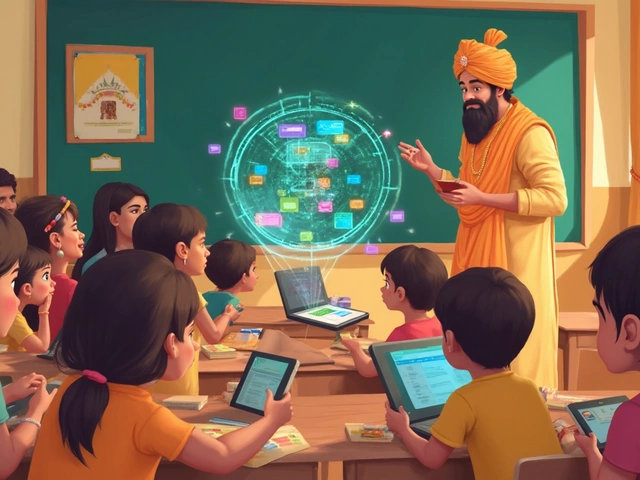Online Degree Comparison Tool
Which degree is right for you?
Compare the 4 most in-demand online degrees for 2025 based on job growth, salary potential, and key skills needed.
Health Informatics
#1 DemandCybersecurity
#2 DemandRenewable Energy Engineering
#3 DemandData Science & Analytics
#4 DemandWhat degree is most in demand right now? It’s not the one you think. Forget about business degrees or general arts programs. The real winners in 2025 aren’t about prestige-they’re about solving real problems, filling real gaps, and getting hired fast. If you’re thinking about going back to school online, you need to know where the jobs are, not just where the degrees look nice on a resume.
Health Informatics is blowing up
Healthcare isn’t just about doctors and nurses anymore. It’s about data. Hospitals in Australia, the U.S., and Europe are drowning in patient records, billing codes, and appointment logs-and they don’t have enough people who can turn that mess into useful insights. That’s where health informatics comes in.
This degree blends medical knowledge with data analysis, IT systems, and clinical workflows. You don’t need to be a doctor. You don’t even need a science background. Many online programs accept applicants with any bachelor’s degree and give you the training you need. Graduates work as clinical data analysts, EHR specialists, or health systems coordinators.
In Australia, the Department of Health reported a 42% increase in job postings for health informatics roles between 2023 and 2025. Hospitals in Sydney and Melbourne are now offering signing bonuses of up to $15,000 for qualified candidates. And the best part? Most of these roles can be done remotely after the first year.
Cybersecurity is no longer optional
Every business, big or small, is a target. A single phishing email can cost a company millions. That’s why cybersecurity degrees are now the most searched-for online programs globally.
Unlike traditional IT degrees, cybersecurity programs focus on threat detection, incident response, network defense, and compliance. You’ll learn how to protect data, audit systems, and respond to breaches-not just how to fix a printer.
Online degrees from accredited providers like Southern Cross University and Deakin offer certifications that match industry standards: CompTIA Security+, CISSP, and CEH. Employers don’t care if you studied online-they care if you can pass the practical exams. Graduates land jobs as security analysts, penetration testers, or GRC (Governance, Risk, Compliance) specialists. The average starting salary in Australia? $85,000. Mid-level roles hit $120,000+.
And here’s the kicker: there are over 3.5 million unfilled cybersecurity jobs worldwide. Australia alone needs another 15,000 by 2026. This isn’t a trend. It’s a crisis.
Renewable Energy Engineering is the new civil engineering
Remember when everyone wanted to be a civil engineer? Now, the hottest degree in energy is renewable energy engineering. Solar farms, wind turbines, battery storage systems, and smart grids are replacing coal plants-and someone has to design, install, and maintain them.
Online programs from RMIT and the University of South Australia let you study part-time while working. You’ll learn about photovoltaic systems, grid integration, energy storage tech, and policy frameworks. Many courses include virtual labs using real-world data from Australian solar installations.
By 2030, Australia plans to generate 82% of its electricity from renewables. That means thousands of new roles in project management, system design, and field operations. Companies like AGL, Origin Energy, and Neoen are hiring engineers with online degrees at the same rate as those with traditional degrees. The pay? $90,000-$130,000 depending on experience.

Data Science and Analytics are everywhere
You’ve heard this before-but it’s still true. Data science isn’t just for tech giants. It’s for supermarkets, banks, schools, and even local councils.
An online data science degree teaches you Python, SQL, machine learning basics, and how to visualize data with tools like Tableau or Power BI. You don’t need a math PhD. Many programs start with statistics for beginners and build up from there.
Graduates work as business analysts, marketing analysts, operations analysts, or data engineers. In Sydney, over 6,000 data-related roles were posted in the last 12 months. The biggest employers? Telstra, Commonwealth Bank, and the NSW Government. Even small businesses are hiring data analysts to track customer behavior and optimize inventory.
One graduate from an online course at Torrens University landed a job at a regional hospital analyzing patient wait times. Her model cut delays by 30%. That’s the power of this degree: it solves problems you can see and measure.
Why not nursing or teaching?
You might be thinking: What about nursing? Teaching? They’re always in demand.
They are. But here’s the catch: those degrees still require hands-on clinical hours or teaching practicums. You can’t do that fully online. If you’re looking for a degree you can complete 100% remotely, with no need to travel or show up in person, nursing and teaching are out.
That doesn’t mean they’re bad choices. But if your goal is flexibility, speed, and remote work potential, the degrees above give you more freedom-and higher pay-without the physical constraints.
What to avoid
Not all degrees are created equal. Stay away from these:
- General Business Administration (unless you’re aiming for an MBA later)
- Psychology (unless you’re planning to go to grad school for clinical work)
- Communications (too broad, too many graduates, too few jobs)
- Early Childhood Education (requires in-person placements and low pay)
These degrees still have value-but they’re not the fastest path to a high-demand job. If you’re spending time and money online, pick something with clear job outcomes.

How to pick the right program
Not all online degrees are accredited. Not all are respected. Here’s how to pick:
- Check if the provider is registered with TEQSA (Tertiary Education Quality and Standards Agency) in Australia.
- Look for industry partnerships-do they work with hospitals, tech firms, or energy companies?
- Ask if graduates get certified in recognized tools (like AWS, Tableau, or CompTIA).
- Read job boards. Search for "degree required" in roles you want. See what employers actually ask for.
- Make sure you can complete the program in 2-3 years part-time. Avoid anything that takes 4+ years.
One student in Adelaide chose a 2-year online cybersecurity degree from Charles Sturt University. She got certified in CompTIA Security+ halfway through. By graduation, she had two job offers. One was remote from a U.S. company. She took it.
Bottom line
The most in-demand degree in 2025 isn’t about what’s popular. It’s about what’s needed. Health informatics, cybersecurity, renewable energy engineering, and data science are the four that stand out. They pay well. They’re growing fast. And they can be done online, on your schedule.
Don’t chase degrees because they sound impressive. Chase the problems businesses are desperate to solve. That’s where the jobs are.
Is an online degree as good as a traditional one?
Yes-if it’s from an accredited institution. Employers in Australia and globally no longer distinguish between online and on-campus degrees from the same university. What matters is the skills you gain, the certifications you earn, and the projects you complete. Many tech and healthcare companies now require proof of skills (like portfolios or certifications) more than the type of degree.
Can I get a job with just an online degree and no experience?
You can, but it’s easier if you build experience while studying. Many online programs include capstone projects, internships, or industry simulations. Even volunteering for a local nonprofit to analyze their data or help set up a digital health record system counts. Employers care more about what you can do than where you studied.
Which of these degrees has the fastest path to a job?
Cybersecurity and data analytics. Many online programs offer short, focused certifications (like Google Data Analytics or CompTIA Security+) that can be completed in 6-9 months. These certifications alone have landed people entry-level jobs. A full degree takes 2-3 years, but you can start working after the first year if you build skills early.
Do I need to be good at math for data science or cybersecurity?
You need basic statistics and logical thinking-not advanced calculus. Most online programs teach the math you need as part of the course. If you can understand percentages, averages, and patterns, you’re already ahead. Tools like Python and Excel do the heavy lifting. Focus on problem-solving, not formulas.
Are these degrees expensive?
Compared to traditional degrees, online programs are often cheaper. Many Australian universities offer online degrees at 30-50% lower tuition. Plus, you save on commuting, relocation, and housing. Some employers even pay for part of your tuition if you’re working. Check with your current employer-many offer study assistance programs.
What if I don’t have a bachelor’s degree yet?
You can still start with diplomas or advanced diplomas in these fields. Many institutions offer pathway programs that let you move from a diploma to a full bachelor’s. For example, TAFE NSW offers a Diploma in Health Informatics that can credit into a degree at a university. This is a smart way to test the waters without committing to four years upfront.
Next steps
Start by picking one field that excites you. Then search for accredited online programs in Australia. Look at the curriculum-not the website design. See if they teach real tools, not just theory. Reach out to alumni on LinkedIn and ask: "What did you do after graduation?"
Don’t wait for the perfect time. The jobs are here. The degrees are online. All you need is to start.







0 Comments